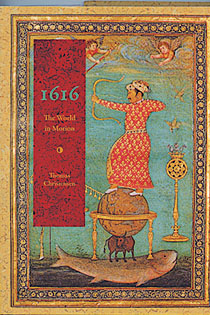 Of the making of books there is no end, Ecclesiastes warns, and today its author could have added, “with numbers for titles.” On the heels of 1491, 1493 and 1494, to consider only one well-represented 15th-century decade, comes 1616, a year most notable for the deaths of both Shakespeare and Cervantes. The year’s ordinariness is actually part of its appeal for Christensen, who believes attaching his tale of a premodern world in the first throes of globalization to a well-known date—say, 1492—would see its everyday moments overshadowed by the big event. And there’s no doubt his general timing is good.
Of the making of books there is no end, Ecclesiastes warns, and today its author could have added, “with numbers for titles.” On the heels of 1491, 1493 and 1494, to consider only one well-represented 15th-century decade, comes 1616, a year most notable for the deaths of both Shakespeare and Cervantes. The year’s ordinariness is actually part of its appeal for Christensen, who believes attaching his tale of a premodern world in the first throes of globalization to a well-known date—say, 1492—would see its everyday moments overshadowed by the big event. And there’s no doubt his general timing is good.
The world was in upheaval by the early 17th century: European trade routes to Asia were well-established; the Spanish had overthrown the indigenous states of what was now Latin America and had established, with Ming China, one of the most lucrative and violent East-West exchange points ever known in the Philippines; and the first African slaves had crossed the Atlantic.
Where Christensen shines, though, is in his tales of individuals incongruently ricocheting around this newly opened world. There’s the samurai Hasekura Tsunenaga, visiting the Vatican in late 1616. And in one of the most arduous journeys of the day, Tsunenaga—the last Japanese ambassador to Europe until 1862—had taken a ship to Acapulco, crossed Mexico by donkey and sailed on to Spain.
And then there were the truly random wanderers, who seem as alienated from their home societies as any modern globetrotter. An Italian traveller met George Strachan in the desert outside Baghdad, where the Scotsman had been following the life of a nomadic Arab, because of “the generous mode of freedom in which they live.” Strachan, however, was about to depart for India, because the local authorities were urging circumcision on him. His later years are unknown, Christensen notes, but every so often Eastern manuscripts surface, like the Persian book in the British Library bearing the note, “translated into Latin by George Strachan, Scot of the Mearns, 1634.”